Serving 2,079 students in grades 9-12, Naaman Forest High School ranks in the bottom 50% of all schools in Texas for overall test scores (math proficiency is bottom 50%, and reading proficiency is bottom 50%).
The percentage of students achieving proficiency in math is 30% (which is lower than the Texas state average of 41%). The percentage of students achieving proficiency in reading/language arts is 34% (which is lower than the Texas state average of 51%).
The student:teacher ratio of 16:1 is higher than the Texas state level of 14:1.
Minority enrollment is 91% of the student body (majority Hispanic), which is higher than the Texas state average of 75% (majority Hispanic).
Quick Stats (2025)
- Grades: 9-12
- Enrollment: 2,079 students
- Student:Teacher Ratio: 16:1
- Minority Enrollment: 91%
- Graduation Rate: 92% (Top 50% in TX)
- Overall Testing Rank: Bottom 50%
- Math Proficiency: 30% (Btm 50%)
- Reading Proficiency: 34% (Btm 50%)
- Science Proficiency: 41% (Top 50%)
- Source: National Center for Education Statistics (NCES), TX Dept. of Education
School Overview
Naaman Forest High School's student population of 2,079 students has stayed relatively flat over five school years.
The teacher population of 127 teachers has declined by 8% over five school years.
Grades Offered
Grades 9-12
Total Students
2,079 students
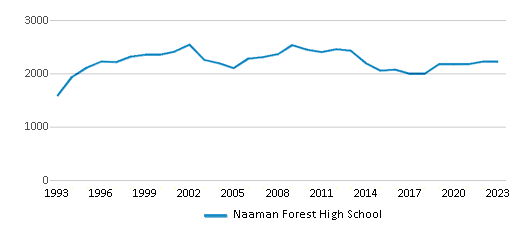
Gender %
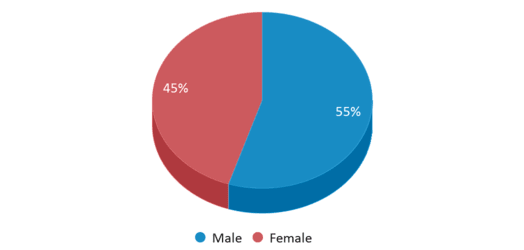
Total Classroom Teachers
127 teachers
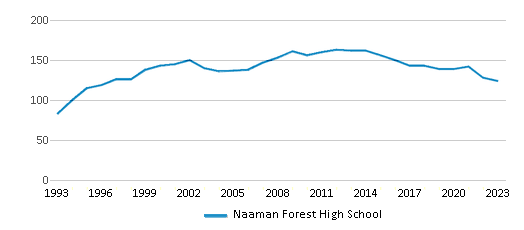
Students by Grade
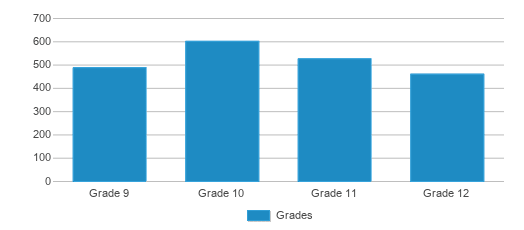
School Rankings
Naaman Forest High School ranks within the bottom 50% of all 8,188 schools in Texas (based off of combined math and reading proficiency testing data).
The diversity score of Naaman Forest High School is 0.63, which is less than the diversity score at state average of 0.64. The school's diversity has stayed relatively flat over five school years.
Overall Testing Rank
#6621 out of 8188 schools
(Bottom 50%)
(Bottom 50%)
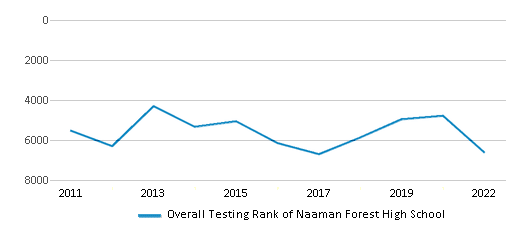
Math Test Scores (% Proficient)
30%
41%
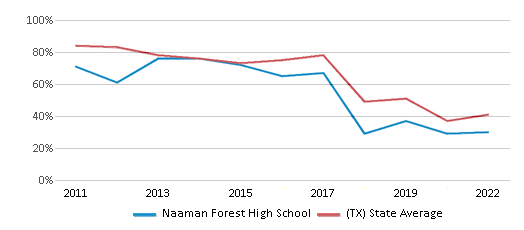
Reading/Language Arts Test Scores (% Proficient)
34%
51%
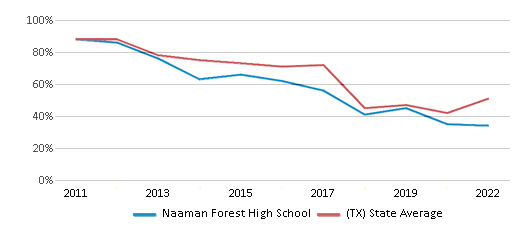
Science Test Scores (% Proficient)
41%
46%
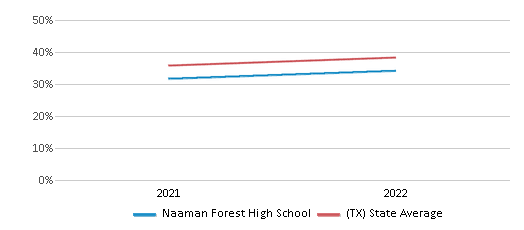
Student : Teacher Ratio
16:1
14:1
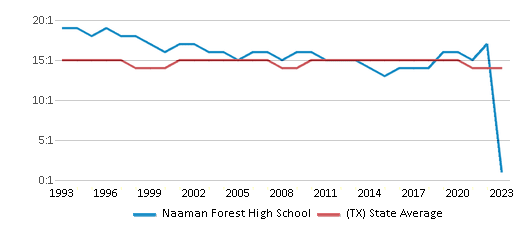
American Indian
1%
n/a
Asian
11%
6%
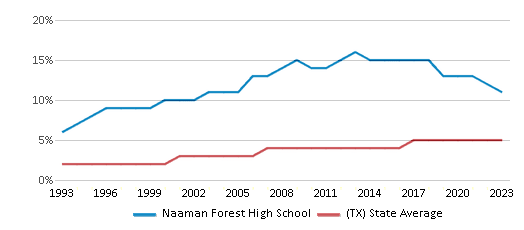
Hispanic
56%
53%
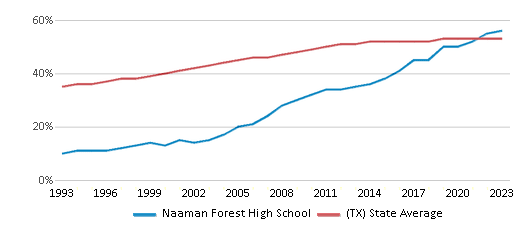
Black
21%
13%
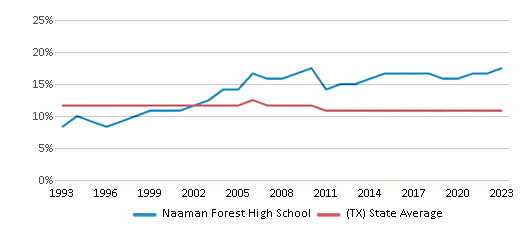
White
9%
25%
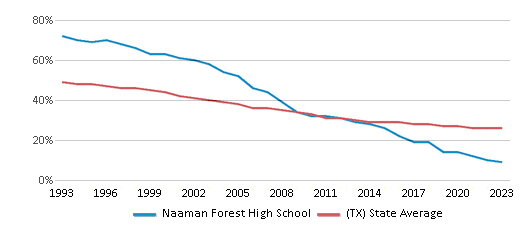
Hawaiian
n/a
n/a
Two or more races
2%
3%
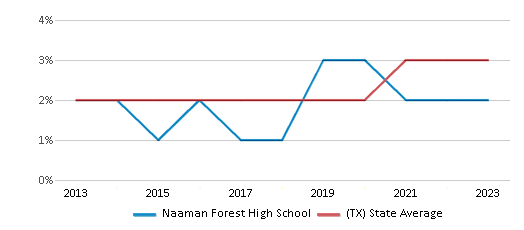
All Ethnic Groups
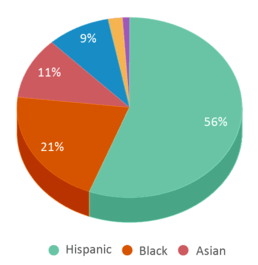
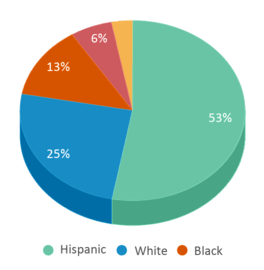
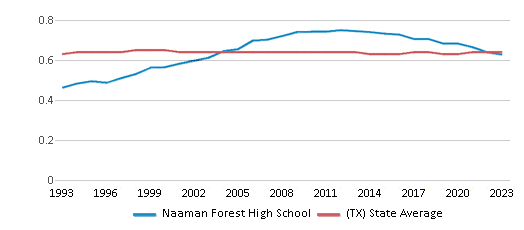
Graduation Rate
92%
90%
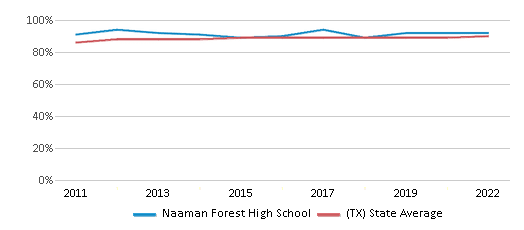
Participates in the National School Lunch Program (NSLP)
Yes
Eligible for Free Lunch
59%
57%
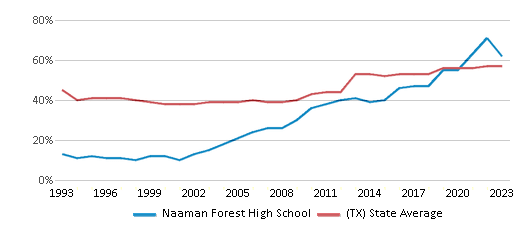
Eligible for Reduced Lunch
4%
5%
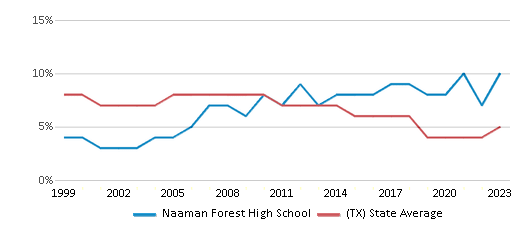
School Statewide Testing
School District Name
Source: National Center for Education Statistics (NCES), TX Dept. of Education
Profile last updated: 02/09/2025
Frequently Asked Questions
What is Naaman Forest High School's ranking?
Naaman Forest High School is ranked #6621 out of 8,188 schools, which ranks it among the bottom 50% of public schools in Texas.
What schools are Naaman Forest High School often compared to?
Naaman Forest High Schoolis often viewed alongside schools like Rowlett High School, Sachse High School, Garland High School by visitors of our site.
What percent of students have achieved state testing proficiency in math and reading?
30% of students have achieved math proficiency (compared to the 41% TX state average), while 34% of students have achieved reading proficiency (compared to the 51% TX state average).
What is the graduation rate of Naaman Forest High School?
The graduation rate of Naaman Forest High School is 92%, which is higher than the Texas state average of 90%.
How many students attend Naaman Forest High School?
2,079 students attend Naaman Forest High School.
What is the racial composition of the student body?
56% of Naaman Forest High School students are Hispanic, 21% of students are Black, 11% of students are Asian, 9% of students are White, 2% of students are Two or more races, and 1% of students are American Indian.
What is the student:teacher ratio of Naaman Forest High School?
Naaman Forest High School has a student ration of 16:1, which is higher than the Texas state average of 14:1.
What grades does Naaman Forest High School offer ?
Naaman Forest High School offers enrollment in grades 9-12
What school district is Naaman Forest High School part of?
Naaman Forest High School is part of Garland Independent School District.
School Reviews
5 12/21/2011
I was a student who attended Naaman Forest for all four years. I disapprove of this school and advise others not to attend this institution unless they desire to benefit very little. I personally wrote a letter of complaint to the school board; my paper was six pages long complete with a bibliography. Originally the paper was a proposal I wrote for my dual credit English class. My teacher, who will remain anonymous, encouraged me to do something about the situation and possibly have my voice heard through the school board. The paper addressed the severe issues Naaman faces on a daily basis including poor teachers, poorly taught classes and virtually no discipline regarding misbehavior. I mailed the letter twice to the garland school board and it was ignored. This is very unfortunate; I got no letter of recognition, not even a phone call back. When you read the "school notes overview" listed on this website, one may notice how productive the school seems, yet underneath it all the school image is a gilded one. "Naaman Forest High School has a strong philosophy for continuous improvement." Funny, because throughout high school I struggled in math and never received the help I desperately needed. I didn't know how to solve simple problems including the addition of negative numbers, multiplying fractions, or finding the slope of a line. I had to wait until college to finally understand elementary algebra, when I should've learned it years ago. I am now enrolled in my third developmental math class at Richland, and I finally understand how to solve simple math problems. I am not saying that every teacher at Naaman Forest is horrible; there are many teachers I have had whom have made a significant difference; those who have tried their best to teach what they love. I support them in all ways, and I hope they continue teaching in the future. Though Naaman possesses some remarkable teachers, most are not so great. I will continue to speak out against Naaman, but I need your help. This is not only a "Naaman problem", but a national problem including most public institutions. How much more are we going to take? "Furthermore, the campus strives to continuously improve its performance on district and state assessments, as well as, academic and athletic competitions." If we want this to be true, we've got to do something. Who doesn't want their child to succeed in all ways, and become something one is proud of? The action must begin now. Not tomorrow, not ten years from now, but today. Start by getting to know the teachers your son or daughter has in class; make education a priority by getting involved in the life of the school. If we all work together, we can really change something. :)
2 5/3/2010
Parent/teacher conference are scheduled during the time I work. The student dress code is not enforced. I have seen many, many students sagging and girls showing cleavage when I am at the school for a concern. Beware of teachers that are also coaches. I have learned from personal experience (my son's teacher) coaching seems to be priority.
Review Naaman Forest High School. Reviews should be a few sentences in length. Please include any comments on:
- Quality of academic programs, teachers, and facilities
- Availability of music, art, sports and other extracurricular activities
Recent Articles

What Is A Charter School?
Explore the world of charter schools in this comprehensive guide. Learn about their history, how they operate, and the pros and cons of this educational innovation. Discover key facts about charter schools, including admission policies, demographics, and funding, as well as what to look for when considering a charter school for your child.

10 Reasons Why High School Sports Benefit Students
Discover the 10 compelling reasons why high school sports are beneficial for students. This comprehensive article explores how athletics enhance academic performance, foster personal growth, and develop crucial life skills. From improved fitness and time management to leadership development and community representation, learn why participating in high school sports can be a game-changer for students' overall success and well-being.

February 05, 2025
Understanding the U.S. Department of Education: Structure, Impact, and EvolutionWe explore how the Department of Education shapes American education, from its cabinet-level leadership to its impact on millions of students, written for general audiences seeking clarity on this vital institution.




![A group of high school band students are playing tennis one day when one finds something interesting on his phone. What he discovers sends them all on a trip to nostalgia lane.Special thanks to :
Mr. Taylor, friends in video, and.. EVERYONE WHO SUBMITTED PICTURES AND VIDEOS! This wouldn't have been possible without yall! :)Quick apologies to Jonathan Garmendez, Stephen Goins, and Andrew Hafer really quick as I left them out of the Benior Soys section in the original video at the Band Banquet showing. I've fixed that in this version. ;)Songs :
Khai Dreams - Summer is Like a Dream
Chainsmokers - Closer
This Will Destroy You - Quiet (Speeches by Eric Thomas)
Daniel Skye - Stuck On You (ft. PnB Rock)
Steelix - Lay It Down [REPLACED OLD SONG IN ORDER TO UPLOAD]
Khai Dreams - TravelsWhen Mr. Taylor first came up to me with this opportunity I wasn't sure how I was going to do it because not only did we not have an official photographer this year but GISD didn't upload much of the marching bands either so I was kind of stuck. But with the help of the band I was able to gather enough things to make a video out of! Thankyou all again for the clips!As an aspiring Film Maker I wanted to make something more than a slideshow, I wanted to tell a story. I didn't just want to plop clips into a program and choose a couple songs and let it spew it back out for me. I tried to tell a story and make it somewhat interesting, I hope y'all enjoyed it! Here's to another year!NFHS Pride! Naaman Forest High School 2017-2018 Band Slideshow](https://i.ytimg.com/vi/yyhrltE87Tw/0.jpg)




